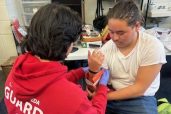A Valuable Lesson
This in-service training idea makes lifeguards think hard about the value of a human life.


One of the hardest messages to get across to young guards is the importance of staying vigilant. We teach them about the mechanism of injury and how to be proactive in “heading harm off at the pass.” We try to make them understand that the mechanism of injury in our profession is the very thing we invite people to play and swim in — we invite patrons to our facilities and promise to keep them safe.
It’s a weighty promise, to say the least, one that teenagers may have a hard time getting their heads around. How can you make them stop and think about their scanning techniques and the need to stay vigilant? How can you make them remember that every day they stand between possible life and death for those they have sworn to protect? How can you make them get it?
I use an in-service training technique that accomplishes those objectives in spades. But be warned: It’s not for the faint of heart. I don’t recommend this exercise unless you have already established trust with all the guards. They must understand your dedication to their fullest professional development.
It’s best to perform this program at the end of a training session, so the guards feel as if you’re wrapping things up. You might also want to role play it with some of your other staff before performing it “live.”
Once you’re ready, gather your team together after an in-service program, and announce that the last thing on your agenda is a kind of aquatic scavenger hunt. This will get them excited — and lower their guard.
The hunt works like this: You’ve hidden a roll of quarters somewhere below the water’s surface. The guard who finds the roll of quarters gets to keep the spoils. Then set them free to hunt.
Once one of the guards finds the roll (this shouldn’t take too long, based on my experience) gather your team back together to congratulate the winner. After you offer congratulations, the gloves come off. With your team gathered together, pose the question: “So, how much is a human life worth?” No doubt, the guards will answer that life is priceless.
Depending on your acting ability, you can look puzzled or troubled. Then pose the question again. This will make the guards realize they are missing something.
That’s when you turn the scavenger hunt on its head. You tell them that they established the price of a human life as less than $10. At this point, they will want to know what you mean. Wait for them to ask the question. That’s when you tell them that during the scavenger hunt, you watched how they scrutinized every square inch of the water — top to bottom. How not a speck of the bottom escaped their focused, regimented scan. Then you can either point out or pose the question: Have any of them honestly ever performed such a vigilant scan while guests were present in their zone as they had when their motivation was that roll of quarters? This question, like the exercise, will really make them think.
If your team is anything like mine, later that day, you’ll find the roll of quarters on your desk.


